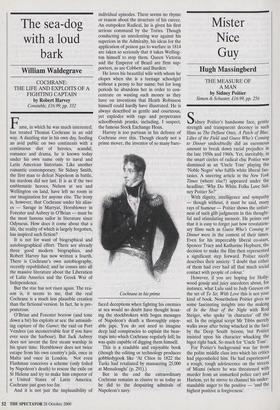The sea-dog with a loud bark
William Waldegrave
COCHRANE: THE LIFE AND EXPLOITS OF A FIGHTING CAPTAIN by Robert Harvey Constable, £16.99, pp. 332 Fame, in which he was much interested, has treated Thomas Cochrane in an odd way. A dazzling star in his own day, feeding an avid public on two continents with a continuous diet of heroics, scandal, romance and drama, he is known today under his own name only to naval and Latin American historians. Like another romantic contemporary, Sir Sidney Smith, the first man to defeat Napoleon in battle, his stardom did not last. It is as if the two emblematic heroes, Nelson at sea and Wellington on land, have left no room in our imagination for anyone else. The irony is, however, that Cochrane under his alias- es — Savage in Marryat, Hornblower in Forester and Aubrey in O'Brian — must be the most famous sailor in literature since Odysseus. How does it come about that a life, the reality of which is largely forgotten, has inspired such fiction?
It is not for want of biographical and autobiographical effort. There are already three good modern biographies, and Robert Harvey has now written a fourth. There is Cochrane's own autobiography, recently republished; and he comes into all the massive literature about the Liberation of Latin America and the Greek War of Independence.
But the star has not risen again. The rea- son is, it seems to me, that the real Cochrane is a much less plausible creation than the fictional version. In fact, he is pre- posterous.
O'Brian and Forester borrow (and tone down a bit) his exploits at sea: the astonish- ing capture of the Gamo; the raid on Port Vendres (an inconceivable feat if you have ever seen the harbour). But Jack Aubrey does not invent the first steam warship in his spare time. Hornblower does not twice escape from his own country's jails, once in Malta and once in London. Not even Flashman conceives a scheme (only foiled by Napoleon's death) to rescue the exile on St Helena and try to make him emperor of a United States of Latin America. Cochrane just goes too far.
And it is not just the implausibility of individual episodes. There seems no rhyme or reason about the structure of his career. An outspoken Radical, he is given his first serious command by the Tories. Though conducting an unrelenting war against his superiors in the Admiralty, his ideas for the application of poison gas to warfare in 1814 are taken so seriously that it takes Welling- ton himself to stop them. Queen Victoria and the Emperor of Brazil are firm sup- porters, as are Cobbett and Burdett.
He loves his beautiful wife with whom he elopes when she is a teenage schoolgirl without a penny to her name; but for long periods he abandons her in order to con- centrate on wasting such money as they have on inventions that Heath Robinson himself could hardly have illustrated. He is always described as gentle and courteous, yet explodes with rage and perpetrates schoolboyish pranks, including, I suspect, the famous Stock Exchange Hoax.
Harvey is too partisan in his defence of Cochrane over this. Though clearly not a prime mover, the inventor of so many bare- Cochrane in his prime faced deceptions when fighting his enemies at sea would no doubt have thought hoax- ing the stockbrokers with bogus messages of Napoleon's death a thoroughly enjoy- able jape. You do not need to imagine deep laid conspiracies to explain the bear- traps into which Cochrane regularly fell; he was quite capable of digging them himself.
This is a readable and enjoyable book (though the editing or technology produces gobbledygook like 'At Chios in 1822 the Turks had retaliated by massacring 25,000 at Messalonghi' (p. 291).) But in the end the extraordinary Cochrane remains as elusive to us today as he did to the despairing admirals of Napoleon's navy.


























































































 Previous page
Previous page